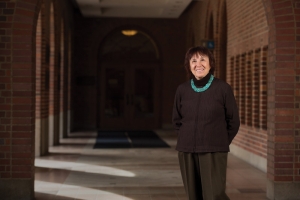From Foster Child to Philanthropist: Gift to Endow New Foster Youth Program at USC Telehealth
May 12, 2015 / by Joanna Scott- Alumni
- Giving
At the age of three, Lynne Okon Scholnick, MSW ’72, and her older sister, Elsa, were taken to a foster care agency by their father. Her mother became institutionalized for what was then called melancholia, now known as depression, and never returned home. Until Scholnick graduated from high school, she would remain in foster care.
She lived in three different homes throughout her childhood. The first home was kind; the second, where she and her sister lived for 13 years, was not.
“The foster mother was particularly mean-spirited,” she said. The family had two older daughters already in college. “The eldest daughter was called ‘the beautiful one,’ the second was ‘the smart one,’ Elsa was labeled ‘the bad one,’ and I was ‘the dumb one.’ Children believe what they are told, so when I went to school, there was no attempt on my part to disprove what I had been labeled.”
Scholnick recalls she was taught to be ashamed because she did not live with her real parents.
“It was supposed to be a secret that we were foster children,” she said.
She learned about family love through witnessing the relationships other children had with their parents. Every morning she observed the mother next door waving to her daughters as they left for school. No one did that in her household. Scholnick was permitted to take ballet lessons at a local YWCA, but no one ever came to her recitals. She accepted this as just the way things were.
But once she left the foster care system, started a family of her own and became a social worker, which she did in large part to help women avoid the same fate as her mother’s, Scholnick knew that how she was raised was not how things were supposed to be. She decided she wanted to do something to ensure other foster children receive more help than she did. That’s why she recently endowed a new program at USC Telehealth that will help build confidence and resilience in foster youth through caring therapeutic relationships.
Making it better
USC Telehealth at the USC School of Social Work provides a virtual outpatient therapy program via the Internet. Individual sessions are conducted online using telecommunication technology by a treatment team consisting of licensed clinical social workers and highly trained supervised Master of Social Work interns, providing services to clients wherever they are based.
The clinic has been successful in providing therapy for populations that normally would have limited or no access to it, or may be reluctant to engage with a therapist in person.
“At first I struggled with the idea that sessions would be via the Internet since, as a therapist, I am accustomed to face-to-face therapy, and am not sophisticated with technology,” Scholnick said. “Then I realized that this generation is comfortable with technology, and it may even be preferable to the people that USC Telehealth will serve.”
According to USC Telehealth Clinical Director Nadia Islam, continuity of care has been a problem for those in the child welfare system and offering an Internet-based alternative might ameliorate that issue.
“With our technology, we can follow the youth wherever they go, regardless if they are placed in a new home or if they return to their biological family from a foster family living arrangement,” she said.
Addressing obstacles that impede foster youths’ academic success is another way in which therapy of this kind has meaningful impact.
“If we can make their current placement a sustainable one by helping the youth develop better problem-solving or conflict-resolution skills, they will be less likely to switch schools so often,” Islam said.
For Scholnick, the delivery of mental health services in such an innovative fashion heartens her resolve to pay it forward to those who need her help the most.
“I would like foster kids to have the same opportunities as other kids, in families that inspire healthful psyches and education,” she said. “It pains me to read about children in the system, who have ended up on the streets or in prison because no one cared enough to help them make better choices.”
“I believe everyone has something to contribute to society,” she said.
To reference the work of our faculty online, we ask that you directly quote their work where possible and attribute it to "FACULTY NAME, a professor in the USC Suzanne Dworak-Peck School of Social Work” (LINK: https://dworakpeck.usc.edu)
